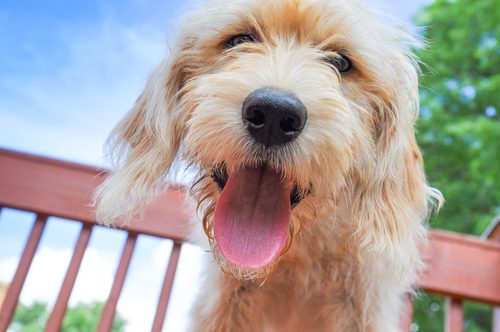
If you’re finding this summer a long and hot one, just imagine what it’s like for our pets. While we have sweat glands all over our bodies to help us regulate our temperature, animals don’t have the ability to cool themselves down as easily.
Dogs and cats only have a few sweat glands around their noses and in their feet and so rely on panting to cool themselves down. Small pets – such as rabbits, guinea pigs and ferrets – don’t sweat and can’t pant, and so find life even more difficult. For chinchillas, who have no ability to dissipate heat, heatstroke can result in fatal seizures. It’s up to us humans to take extra care of our pets in hot weather, providing them with a cool, well-ventilated and shaded environment, with constant access to fresh drinking water.
What is heatstroke?
Heatstroke is a state of hyperthermia, which is defined as an elevated core body temperature above the normal range (as opposed to hypothermia, where body temperature is too low). Heatstroke occurs when heat generation exceeds the body’s ability to lose heat. As an animal’s body temperature rises, they will suffer heat exhaustion and eventually heatstroke. If the body temperature is not brought down, serious organ damage or death can result. Heatstroke is an emergency situation that needs treatment right away.
Which animals are most at risk?
Any pet, even those who are young, fit and healthy, can get heatstroke. However, some pets are more vulnerable, such as:
- Flat-faced dog breeds such as Pugs, Bulldogs and Shih Tzus
- Persian cats
- Netherland dwarf and Lionhead rabbits
- Pets with very thick fur
- Old or very young pets
- Overweight pets
- Pets with breathing or lung problems
- Pets on certain medication
What are the signs of heatstroke in dogs and cats?
Some of the key signs to look out for include:
- Panting heavily
- Becoming upset or distressed
- Dribbling more than usual
- Restless behaviour as your pet tries to find a cooler spot
- Foaming at the mouth
- Bright red gums
- Collapsing or not being able to stand up
- Blood coming from the mouth or nose
- Tremors or seizures
- In cats, excessive grooming in an effort to cool down
What are the signs of heatstroke in rabbits, guinea pigs and other small pets?
Signs to look out for include:
- Acting very sleepy or lethargic
- Drooling
- Taking short, quick breaths
- Falling unconscious or having fits
- In chinchillas, a heatstroke seizure means that movement may become spasmodic and rather than adopting the usual hunched sitting position, they will stretch out on their sides. Their ears may become bright red.
What should I do if I think my pet has heatstroke?
Phone your vet right away and follow their advice. They may instruct you to give your pet some emergency first aid. For the best chance of survival, pets suffering from heatstroke urgently need to have their body temperature lowered gradually.
- Remove your pet from the hot environment immediately to a shaded/cool area.
- Pour small amounts of cool water on them – don’t use cold water as this can cause shock.
- You can drape a damp, cool towel over your dog or cat, but don’t leave this on for more than five minutes, as the towel will start to act as an insulating blanket and make the problem worse.
- For rabbits, guinea pigs and chinchillas, mist their ears lightly with tepid, but not cold water.
- With ferrets, use a cool, but not cold wet towel to gently and slowly wipe your pet down, starting at their heads and then working your way gently down their body to their tails before going down their legs and paws. Repeat this several times to very gradually bring your pet's temperature down.
- For small pets, it’s better to use a cool, wet towel to dampen their fur. Don’t pour water on them as this can do more harm than good.
- Use a fan to maximise heat loss.
- Let your pets drink small amounts of cool water.
- Once their breathing has begun to settle, take your pet to your vet, even if they seem to have made a full recovery.
What will the vet do?
Once your vet has examined your pet, they are likely to insert an intravenous drip to run fluids directly into them to lower their core body temperature, help counteract the effects of shock and minimise the risk of organ damage. They may also supply oxygen and medication as required and run blood tests to check organ function.
How can I reduce the risk of my pet getting heatstroke?
The best way to protect your pet from heatstroke is to keep them cool and hydrated in hot weather.
- Keep your pets out of the sun during the hottest part of the day.
- Walk dogs in the mornings and evenings when it’s cooler and avoid high activity games such as ball throwing.
- Check your pet has constant access to plenty of fresh water and top it up regularly as they might need to drink more than normal on hot days.
- Reposition outdoor hutches so that they are shaded and not exposed to the sun’s direct rays.
- Plastic drinks bottles filled with water and frozen and wrapped in a towel can make good coolers for guinea pigs, rabbits and ferrets to lie against.
- Move the homes of indoor pets well away from windows and draw the curtains.
- Give long-haired pets’ fur a trim throughout summer to help them cope with the heat better.
- Keep your pet at a healthy weight – being heavier than they should makes it harder for them to stay cool.
If you found this useful, you may also like:
10 top tips to keep your pets cool this summer
Sources: pdsa.org.uk, rspca.org.uk, planetguinea.co.uk, rabbitwelfare.co.uk, pets4homes.co.uk














